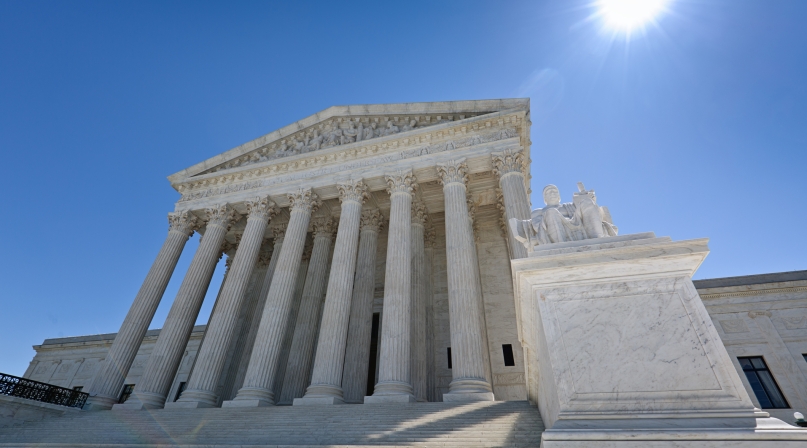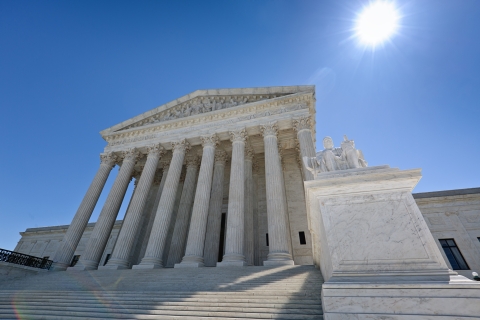Supreme Court to examine local government issues

Key Takeaways
*Indicates a case where the SLLC has filed or will file an amicus brief.
The Supreme Court’s docket for its 2019-2020 term is only half full but it is already teeming with interesting cases, almost all of which involve local governments. Local governments are a party in both of the big cases: A gun case and the Deferred Action for Childhood Arrivals (DACA) case. While it is difficult to pick only five, this article summarizes the most significant cases for local governments the Supreme Court has agreed to hear so far in its term beginning Oct. 7.
In New York State Rifle & Pistol Association Inc. v. City of New York, New York the Supreme Court will decide whether New York City’s ban on transporting a handgun to a home or shooting range outside city limits violates the Second Amendment, the Commerce Clause, or the constitutional right to travel. The Second Circuit held the law is constitutional on all accounts.
Applying intermediate scrutiny under the Second Amendment, the Second Circuit held the rule was “substantially related to the achievement of an important governmental interest.” It seeks to “protect public safety and prevent crime.”
The Second Circuit concluded the rule doesn’t discriminate against interstate commerce in violation of the Commerce Clause. First, it does not facially discriminate against interstate commerce. Licensees may still patronize out-of-state firing ranges—they just can’t bring their gun licensed in New York City. Second, no evidence suggests the rule was intended to protect the economic interests of the city’s firing range industry. Finally, the challengers failed to offer evidence that the rule has had a discriminatory effect on interstate commerce. While the challengers claim they have not attended out-of-city shooting events with their gun they may have attended them without their gun.
The Second Circuit rejected the challengers’ right to travel argument “for much the same reasons as does their parallel invocation of the dormant Commerce Clause.”
In Department of Homeland Security v. Regents of the University of California the Supreme Court will decide whether the Department of Homeland Security’s (DHS) decision to end the DACA program is judicially reviewable and lawful.
DACA was established through a DHS Memorandum during the Obama presidency. The program allowed undocumented persons who arrived in the United States before age 16 and have lived here since June 15, 2007, to stay, work, and go to school in the United States without facing the risk of deportation for two years with renewals available.
DHS rescinded DACA in September 2017 after receiving a letter from the Attorney General stating the program was unconstitutional and created “without proper statutory authority.”
The United States argues that a court can’t review DHS’s decision to rescind DACA because the federal Administrative Procedures Act precludes review of agency actions “committed to agency discretion by law.” According to the United States, DHS’s decision to discontinue DACA “falls comfortably within the types of agency decisions that traditionally have been understood as ‘committed to agency discretion’” — particularly because this decision arose in the immigration context.
The United States argues DACA may be rescinded because it is unlawful as it is a legislative rule which should have been promulgated through notice-and-comment rulemaking and is “substantively inconsistent” with the Immigration and Nationality Act.
Three lower courts have concluded ending the program is both reviewable and unlawful.
Title VII prohibits discrimination “because of . . . sex.” In Zarda v. Altitude Express the Second Circuit held that discrimination on the basis of sexual orientation violates Title VII.
The main opinion in Zarda concluded the question in this case is whether sexual orientation is “properly understood” as a “subset of actions taken on the basis of sex.” The court concluded it is by looking at the statute’s text. According to the court: “the most natural reading of the statute’s prohibition on discrimination ‘because of . . . sex’ is that it extends to sexual orientation discrimination because sex is necessarily a factor in sexual orientation.”
In EEOC v. R.G. & G.R. Harris Funeral Homes the Sixth Circuit held discriminating against transgender persons violates Title VII because it amounts to discrimination on the basis of sex stereotyping. The court also held that transgender status is protected under Title VII. The Supreme Court will review both lower court holdings.
In Price Waterhouse v. Hopkins (1989) the Supreme Court held that employees may bring sex discrimination claims based on sex stereotyping under Title VII. In 2004 the Sixth Circuit extended Price Waterhouse’s reasoning to transgender persons as they are also engaging in “non sex-stereotypical behavior.” So that previous case controlled the outcome of Harris Funeral Homes.
Harris Funeral Homes argued that transgender status refers to “a person’s self-assigned ‘gender identity’” rather than a person’s sex, and therefore such a status is not protected under Title VII. The Sixth Circuit disagreed noting “it is analytically impossible to fire an employee based on that employee’s status as a transgender person without being motivated, at least in part, by the employee’s sex.”
In County of Maui, Hawaii v. Hawaii Wildlife Fund* the Supreme Court will decide whether the Clean Water Act (CWA) requires a National Pollutant Discharge Elimination System (NPDES) permit when pollutants originate from a point source but are conveyed to navigable waters by a nonpoint source, such as groundwater.
Maui County injects treated wastewater from wells into the groundwater. Some of the treated wastewater reaches the Pacific Ocean. The Hawaii Wildlife Fund sued the County arguing it was required to obtain an NPDES permit under the CWA for these discharges.
A party must obtain an NPDES permit if it discharges a pollutant from a point source to a navigable water. Wells are point sources and the Pacific Ocean is a navigable water. The Ninth Circuit assumed without deciding groundwater isn’t a point source or navigable waters.
The Ninth Circuit held that the CWA requires Maui to get an NPDES permit in this case. It concluded that the discharges in this case are point source discharges because “nonpoint source pollution” excludes, for example, roadway runoff that isn’t “collected, channeled, and discharged through a point source.” Here the pollutants are collected in wells. According to the lower court, they are also “fairly traceable” from the point source to the navigable water and reach the navigable water at “more than de minimis levels.”
Conclusion
Further developments in the gun case and the groundwater case may impact whether and how the Supreme Court decides these cases. New York City has informed the Supreme Court it thinks the case is moot as it has changed the law to allow license holders to transport handguns from various locations previously forbidden. The Maui County Council recently passed a resolution supporting settling the case. Even if these cases are removed from the Court’s docket the next term will remain interesting for local governments.

Attachments
Related News

U.S. House passes final minibus funding package
Congress introduced the final FY 2026 Appropriations package, including key county priorities related to transportation, housing, health, emergency management and public safety

U.S. Congress passes minibus funding package
U.S. House and Senate appropriators passed a “minibus” appropriations package containing Fiscal Year (FY) 2025 Interior-Environment, Commerce-Justice-Science and Energy-Water spending bills.

Federal district court issues ruling preventing the federal government from imposing immigration compliance mandates on grant recipients
On November 4, a federal judge in Rhode Island ruled that the U.S. Department of Transportation cannot condition federal grant funding on a recipient’s cooperation with federal immigration enforcement efforts.
